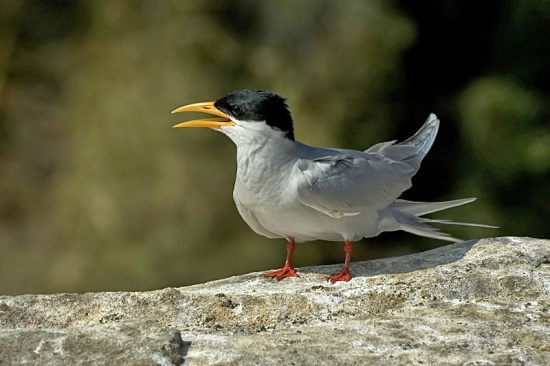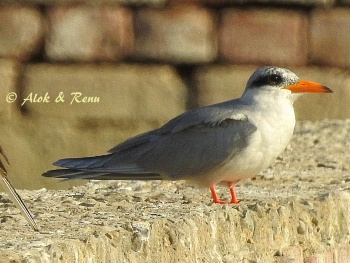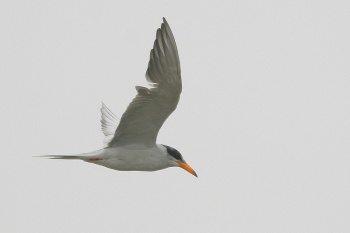Aloktewari (talk | contribs) (Image showing winter plumage added) |
(→External Links: New video search created) |
||
| (6 intermediate revisions by 2 users not shown) | |||
| Line 1: | Line 1: | ||
| − | [[Image:River_Tern2.jpg|thumb|550px|right|Photo by {{user|James+Williams|James Williams}}<br /> Ranganatithu, near Mysore, Southern [[India]], January 2007]] | + | [[Image:River_Tern2.jpg|thumb|550px|right|Photo © by {{user|James+Williams|James Williams}}<br /> Ranganatithu, near Mysore, Southern [[India]], January 2007]] |
;[[:Category:Sterna|Sterna]] aurantia | ;[[:Category:Sterna|Sterna]] aurantia | ||
==Identification== | ==Identification== | ||
| − | [[Image:river_tern_alok.JPG|thumb|350px|right|Winter Plumage<br />Photo by {{user|aloktewari|Alok Tewari}}<br /> Jhajjar, Haryana [[India]], Dec-2016]] | + | [[Image:river_tern_alok.JPG|thumb|350px|right|Winter Plumage<br />Photo © by {{user|aloktewari|Alok Tewari}}<br /> Jhajjar, Haryana [[India]], Dec-2016]] |
38–46 cm (15-18 inches) | 38–46 cm (15-18 inches) | ||
====Breeding==== | ====Breeding==== | ||
| Line 14: | Line 14: | ||
*Stout yellow bill | *Stout yellow bill | ||
*Red legs | *Red legs | ||
| − | [[Image:River_Tern.jpg|thumb|350px|right|Photo by {{user|alkumaheerd|alkumaheerd}}<br />Emer Ab-bandan, Golestan, [[Iran]], January 2005]] | + | [[Image:River_Tern.jpg|thumb|350px|right|Photo © by {{user|alkumaheerd|alkumaheerd}}<br />Emer Ab-bandan, Golestan, [[Iran]], January 2005]] |
====Winter==== | ====Winter==== | ||
*Greyish-white cap with black streaks | *Greyish-white cap with black streaks | ||
| Line 43: | Line 43: | ||
They feed by plunge-diving. | They feed by plunge-diving. | ||
====Breeding==== | ====Breeding==== | ||
| − | They nest in a ground scrape, often on bare rock or sand. The clutch | + | They nest in a ground scrape, often on bare rock or sand. The clutch contains 3 greenish-grey to buff eggs, which are blotched and streaked with brown. |
==References== | ==References== | ||
| − | #{{Ref- | + | #{{Ref-Clements6thAug18}}#Handbook of the Birds of the World Alive (retrieved June 2015) |
| − | #Handbook of the Birds of the World Alive (retrieved June 2015) | ||
{{ref}} | {{ref}} | ||
==External Links== | ==External Links== | ||
| − | {{GSearch|Sterna | + | {{GSearch|"Sterna aurantia" {{!}} "River tern"}} |
| + | <br /> | ||
| + | {{VSearch|"Sterna aurantia" {{!}} "River tern"}} | ||
| + | {{GS-checked}}1 | ||
| + | <br /> | ||
<br /> | <br /> | ||
| − | |||
| − | |||
| − | [[Category:Birds]][[Category:Sterna | + | [[Category:Birds]][[Category:Sterna]] |
Latest revision as of 22:25, 15 May 2023
- Sterna aurantia
Identification
38–46 cm (15-18 inches)
Breeding
- Black crown
- Dark grey upperparts
- White underparts
- Black lores
- Deeply forked tail with long flexible streamers
- Long pointed wings
- Stout yellow bill
- Red legs
Winter
- Greyish-white cap with black streaks
- Dark eye mask
- Dusky bill tip
The sexes are similar
Juveniles
- Brown head
- Grey upperparts with brown marks
- Grey breast sides
- White underparts
- Yellowish bill with a dark tip
Distribution
Asia: found from Pakistan to southern India, Sri Lanka, Nepal and south-western China.
Occasionally observed in Iran.
Taxonomy
This is a monotypic species[1].
Habitat
Breeds on the sandy islands of freshwater inland rivers and lakes. They rarely visit coasts and estuaries.
Behaviour
Diet
Their diet consists of fish, crustaceans, tadpoles and aquatic insects. Has been recorded as eating a frog.
They feed by plunge-diving.
Breeding
They nest in a ground scrape, often on bare rock or sand. The clutch contains 3 greenish-grey to buff eggs, which are blotched and streaked with brown.
References
- Clements, J. F., T. S. Schulenberg, M. J. Iliff, D. Roberson, T. A. Fredericks, B. L. Sullivan, and C. L. Wood. 2018. The eBird/Clements checklist of birds of the world: v2018. Downloaded from http://www.birds.cornell.edu/clementschecklist/download/
- Handbook of the Birds of the World Alive (retrieved June 2015)
Recommended Citation
- BirdForum Opus contributors. (2024) River Tern. In: BirdForum, the forum for wild birds and birding. Retrieved 16 June 2024 from https://www.birdforum.net/opus/River_Tern
External Links
GSearch checked for 2020 platform.1






